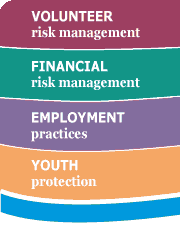Tell Me About It
Communicating With Key Constituencies During a Lawsuit
The article below is excerpted from a new publication available from the Nonprofit Risk Management Center, The Best Defense: 10 Steps to Surviving a Lawsuit. The article addresses the topic covered in Step 6: Communicate with Constituencies.
Receiving notice of a lawsuit can be terribly upsetting. Your first inclination may be to start talking with people in the office about the lawsuit. Don't do it. There have been many cases where a volunteer or employee has given critical and detrimental information on a lawsuit to the other side (sometimes unintentionally, sometimes intentionally). While the plaintiff may have a relationship with your organization, you should never talk to him or her about the lawsuit. Your attorney should communicate on your behalf with the other side if it is necessary.
Many nonprofits defending themselves in a lawsuit must cope with an added dimension in the process. This special challenge is present whenever the plaintiff is someone with whom your organization has an ongoing relationship-one that you hope or expect to continue even after the end of the lawsuit. For example, several years ago a church involved its members in carpentry and other tasks associated with the renovation of the sanctuary. One of the members fell off a scaffolding and died. The deceased's wife -also a member of the church-filed suit against the church. There are countless other examples of lawsuits filed by continuing participants in a nonprofit's program. If your nonprofit is sued by an individual with whom you have an ongoing relationship, you should never take any adverse action against that person because of the suit. A service recipient should continue to enjoy those services for which he is eligible and an employee should not receive adverse treatment because of his suit.
With the above limitations and challenges in mind, in many cases you may need to share information on the lawsuit with key constituencies. The plaintiff may be seeking more than compensation for an injury - he may be talking with the media in an effort to destroy or cripple your organization. Some of the key types of communication that may be required are provided below. In each case, you should consult with counsel before communicating any information about the lawsuit to any constituency.
- Keep the Staff Informed — It is important that the staff and volunteers who visit the office regularly understand several key points. First, the staff should be informed that a lawsuit has been filed. There is no productive purpose in not letting them know, especially when the staff is small. Second, without compromising any sensitive information, you should periodically update the staff on the status of the lawsuit. The detail is less important than that they know, for example, that discovery is ongoing and they may be asked to assist in certain ways. Third, it is important that they be periodically reminded not to speculate or discuss the suit in any way. Finally, remind them that your organization has designated a single spokesperson who is authorized to communicate with other groups, both inside and outside the organization. There is a tendency sometimes for staff who have "inside information" to want to appear knowledgeable with others. This is not the right time for that information to be shared.
- Keep the Board and Key Volunteers Up to Date — A lawsuit against a nonprofit organization is a serious matter with significant consequences beyond financial impact. Even if you believe the financial costs of the lawsuit will be covered by insurance, it's important that the board of directors be informed of many of the same areas as the staff. Because the consequences of a lawsuit may affect fundraising and the organization's image in the community, the board must have sufficient information to determine its strategies for addressing the concerns which might arise. They should also be reminded not to speak about the lawsuit outside the organization and to refer questions to the authorized spokesperson.
- Inform Donors and Supporters as Necessary — In some cases it may be necessary to inform donors and other supporters about the lawsuit, especially where publicity is expected. Release a carefully crafted statement (with the participation of counsel) that: emphasizes your nonprofit's commitment to safety; expresses concern and compassion for any injured parties; does not admit any liability; and expresses a commitment to keep the mission of the organization at the forefront.






